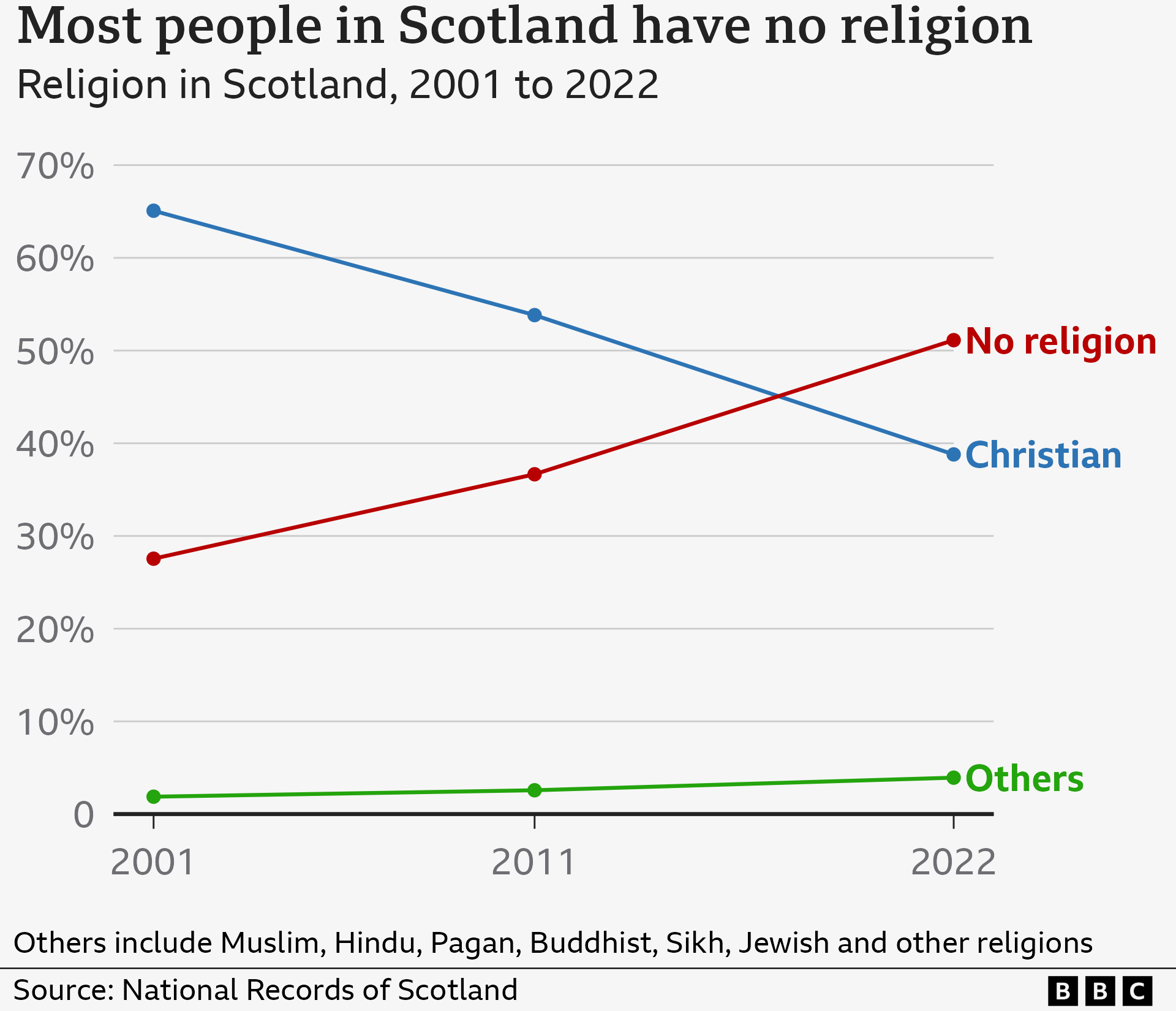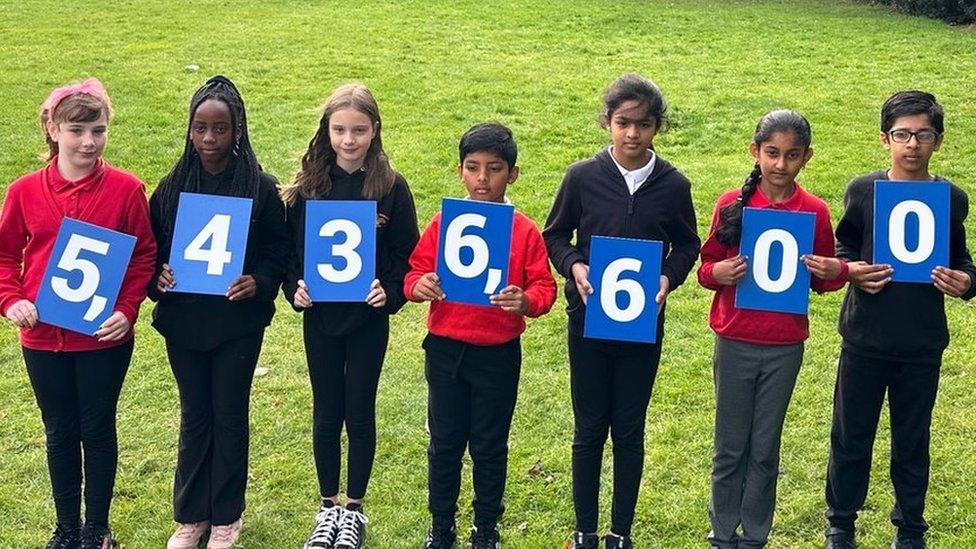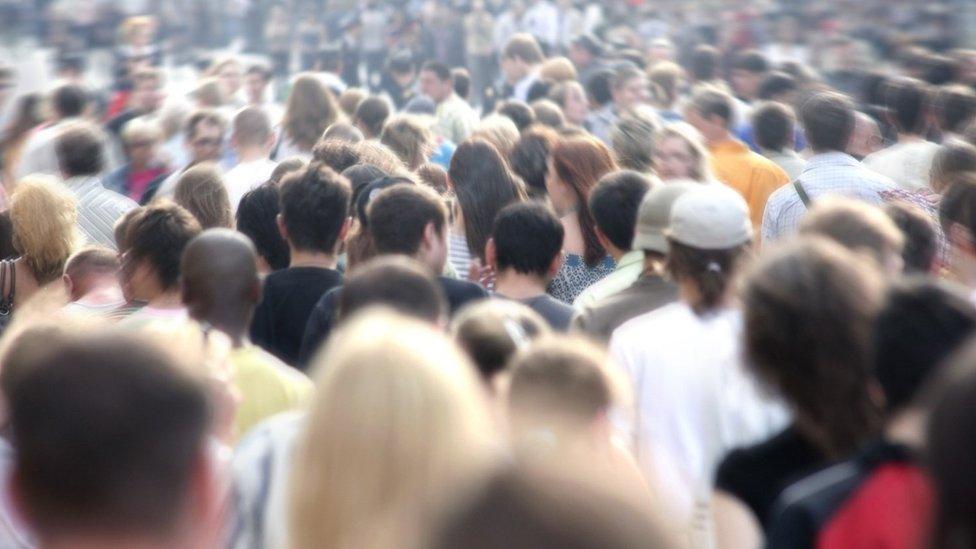Most Scots have no religion - census

The Reverend David Cameron said the decline in Church of Scotland numbers was sobering
- Published
For the first time, a majority of people in Scotland say they are not religious, according to new census data, external.
In the 2022 census, 51.1% of respondents said they had "no religion," up from 36.7% in 2011.
The change was driven by a sharp decline in the number of people describing themselves as being Church of Scotland or Roman Catholic.
While the Church of Scotland remains the largest religious group, its numbers have halved in a decade.

Just a fifth of people in Scotland (20.4%) now say they identify with the Church of Scotland, which has lost a million followers since the dawn of the 21st century.
The number of Roman Catholics has also fallen, down by more than 117,000 in the past decade to stand at 13.3% of the population.
The number of Muslims increased by 43,100 to 119,872 over the same period, from 1.4% to 2.2% of the population.
Younger people were more likely than older people to say they had no religion but the figure was up across all age groups.
Among over-65s, "no religion" more than doubled between 2011 and 2022, an increase of 186,700 people.
It was the most common response in every council area except Na h-Eileanan Siar (Western Isles) and Inverclyde.
In the Western Isles, Church of Scotland (35.3%) was the most common response while in Inverclyde it was Roman Catholic (33.4%).
Other UK countries have also seen an increase in "no religion" but the latest figure for England and Wales (37.2%) is much lower than in Scotland.
The National Secular Society, which advocates for "equal treatment regardless of religion or belief", called the census "a watershed moment," which it said demonstrated the need for "a secular approach to public policy, particularly in education", external.
The Humanist Society Scotland, which promotes empirical observation as opposed to religious belief, said Scotland had made “significant progress” towards becoming a more tolerant society in terms of its attitudes in areas such as sexuality, abortion and assisted dying.
The Reverend David Cameron, from the Church of Scotland, said the decline in membership numbers had been identified as an area of considerable concern by the church.
He said: “It is sobering, and we know that when the church is measured in this way it can feel hurtful for our members and be a source of anxiety for many.
“But our faith and our relevancy cannot be expressed simply as a set of numbers in a table."
Ethnicity
The latest release of census data also showed an increase in people who said they were from a minority ethnic background.
This century, Scotland's minority ethnic population has jumped from 4.5% in 2001, to 8.2% in 2011, before reaching 12.9% in 2022.
The definition of "minority ethnic" includes some groups that were in the white category on the census form such as Irish, Polish, Gypsy/Traveller, Roma and Showman/Showwoman.
The census said that the increase in Scotland’s population was driven by an increase in people born outside of Scotland.
The report also showed:
An increase in the "Polish" category of 29,500 people.
Growth in Scotland’s population of 144,400 (or 2.7%) since 2011 to 5.4 million.
A fall of 90,400 in the number of people living in Scotland who were born in Scotland.
Increases of those born in the rest of the UK (up 49,200) and born overseas (up 185,600).
A rise in the percentage of the population born outside the UK from 7.0% to 10.2%.
Jon Wroth-Smith, National Records of Scotland director of census statistics, said: “Without migration, Scotland’s population would have decreased, and we would have fewer people in younger age groups.”
In other words, Scotland would have more older people in need of support, and fewer working-age people to support them, a challenge sometimes referred to as a demographic time-bomb.
The data are likely to be cited as evidence by those who argue that Scotland needs more immigration to support its economy, especially after Brexit, not less.
Polling suggests support for that view among Scottish voters but also evidence of some concern about the potential impact of immigration on public services and welfare. , external

The percentage of people who said Scottish was their only national identity has increased since the previous census, from 62.4% to 65.5%.
The proportion who said their only national identity was British also increased, from 8.4% to 13.9%.
The percentage who said they felt both Scottish and British fell, from 18.3% to 8.2%.
That comes after a decade dominated by debate about whether or not Scotland should become independent or remain part of the 317-year old union with England.
The majority of people in Scotland chose "Scottish" (77.7%) or "other British" (9.4%) to describe their identity.
Gaelic schools thrive while native language declines
- Published21 May 2024
Census problems
There was a census in Scotland every 10 years between 1801 and 2011, with the exception of 1941 when the UK was at war with Germany.
England and Wales held their most recent census in 2021, with a 97% completion rate.
However, the Scottish government delayed its 2021 census by a year because of the Covid pandemic, and by the initial deadline of April 2022 it had only achieved an average return rate of 79%.
The deadline had to be extended before it finally achieved 89% participation.
A "lessons learned" review of Scotland's census is being carried out.
Further data from the census will be released in the coming months.
- Published14 September 2023

- Published29 November 2022
